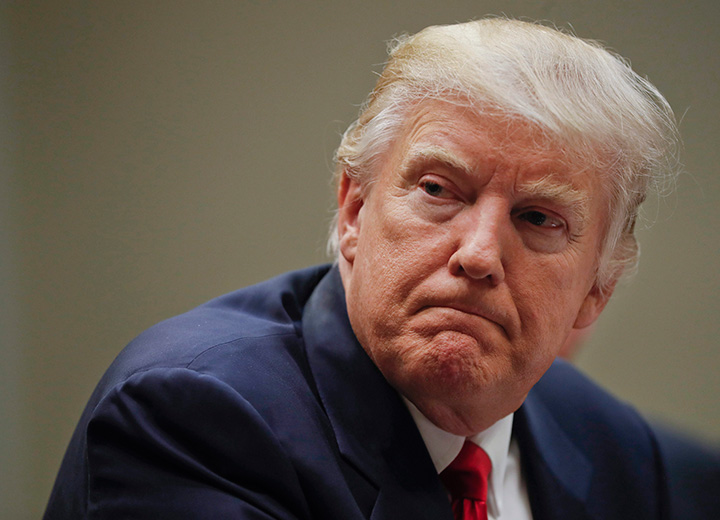To describe relations between U.S. President Donald Trump and the Washington press corps as tense probably understates the issue by several orders of magnitude. So as a public service, and a sincere gesture of goodwill, I want to explain something to the President, and his supporters, that may help clear something up. That isn’t snark. I mean this sincerely.

The matter at hand is Rachel Maddow’s Tuesday report on MSNBC. The network obtained two pages of the President’s 2005 tax returns from Pulitzer-prize winning journalist David Cay Johnston.
READ MORE: Part of Trump’s 2005 tax return revealed
By convention, candidates for that high office have disclosed their tax filings, in a gesture of transparency. Mr. Trump has not done so, leading many to ask why.
I don’t know the answer to that, and to be honest, neither does MSNBC. Their exclusive report wasn’t exactly a bust, but nor was it a blockbuster: In 2005, Donald Trump reported income of $150 million, business losses of $100 million, and paid taxes of $38 million (the figure would have been higher if not for the reported loss). Interesting, but hardly enough to draw any conclusions from.
The President, though, came out swinging. First the White House proactively released details of the two pages in question. And then, this morning, the President expressed skepticism about the reporting. He tweeted “Does anybody really believe that a reporter, who nobody ever heard of, ‘went to his mailbox’ and found my tax returns? @NBCNews FAKE NEWS!”
READ MORE: Trump slams tax return leak as ‘fake news’
I don’t know what the President “really believes,” or what anyone else might. But … yes. That really does happen, a lot. The problem, actually, is that it happens so much you can get buried in it. This is part of the life of a journalist.
I’ve been in the business for almost a decade now, mostly as a columnist at the National Post. But I’ve never actually been a reporter, let alone an investigative one. Even so, my inbox was regularly bombarded with tips, leaks, hints, rumours, allegations and innuendos, including plenty of document dumps. Once your name is known, people send you stuff. Lots of it.
Much of it is simply insane — conspiracy theories, long-winded rants from the mentally ill, or “fake news” propaganda. Then there’s stories that are either verifiably accurate or at least something my gut tells me is true, but aren’t something I can or will touch, because it’s not a big enough story or can’t be effectively and fairly reported. I will always regret letting one story get away, but it was a legally contentious he-said vs. he-said and there was just no way to report it responsibly, even though I 100 per cent believed the person who approached me.
Then there’s that last category, the diamonds in the rough — genuine news stories, from well-placed sources who can offer supportive proof of their claims. In my career, maybe a dozen or so happened just as Mr. Trump suggested: I woke up and they were in my inbox. I’d pass them along to colleagues better able to run them down properly. Sometimes the stories wouldn’t pan out, but a few absolutely did — including one or two I bet you any regular consumer of Canadian news would remember.
The President may find that hard to believe. I can’t change that. But at least believe me when I say this: there are a lot of people out there who possess inside information they think should be in public view, and it’s never been easier to share. Journalists all over the world do their best to give the worthy stories a proper treatment. It’s getting harder and harder to do that, sadly — tough economic times have produced smaller newsrooms, and that takes a toll on reporting, especially stuff that requires heavy lifting and long-term efforts.
But that’s a resource issue on the reporting side. The leaks haven’t let up; I’d bet they’re actually ramping up. And I can only imagine that’s a thousand times truer when the subject of the stories is the most powerful man in the world. Anyone with any dirt on the President, and an axe to grind, will have no problem whatsoever informing a journalist.
RELATED: Legal dispute brewing over leaked tax return documents
If you still doubt me, a small anecdote from my hometown. A few years ago, my colleague Robyn Doolittle, then of the Toronto Star and now of The Globe and Mail, received a phone call telling her that a video existed of Toronto’s then-mayor, Rob Ford, smoking crack cocaine. I won’t retell Robyn’s story here; I’d never do it justice. (You can read it in her book, though.) But this gigantic story, which consumed Canada’s largest city for years and made global headlines, all started because she woke up one morning and someone gave her the story.
That’s not a knock on her, or her colleagues at the Star, who then had to do the legwork of bringing the story to life. It’s just a journalism reality. We wake up every day to this. The President may find that hard to believe, but he shouldn’t.
PS: In the time it took to write this, I received one suggested story. I’ll have to look into it, I guess!
Matt Gurney is host of The Morning Show on Toronto’s Talk Radio AM640 and a columnist for Global News.








Comments